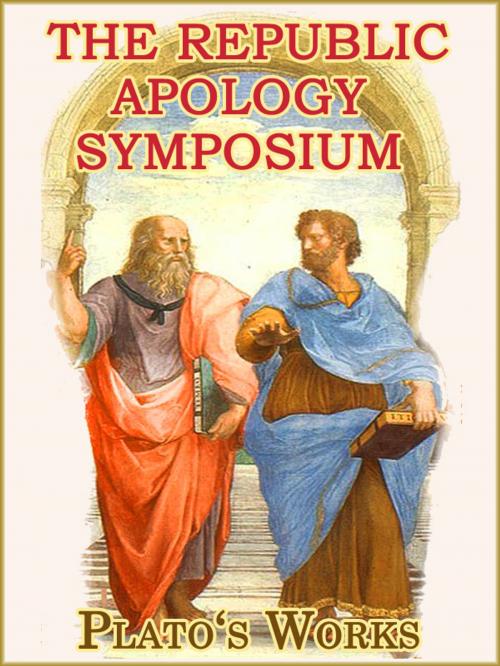The Famous Works of Plato: THE REPUBLIC, APOLOGY, SYMPOSIUM
Nonfiction, Social & Cultural Studies, Social Science, Methodology, History, World History, Political Science, Politics, History & Theory| Author: | Plato | ISBN: | 1230000096306 |
| Publisher: | iSe Classic House | Publication: | January 1, 2013 |
| Imprint: | Language: | English |
| Author: | Plato |
| ISBN: | 1230000096306 |
| Publisher: | iSe Classic House |
| Publication: | January 1, 2013 |
| Imprint: | |
| Language: | English |
The Republic is a Socratic dialogue by Plato, written in approximately 380 BC. It is one of the most influential works of philosophy and political theory, and arguably Plato’s best known work. In it, Socrates and various other Athenians and foreigners discuss the meaning of justice and whether the just man is happier than the unjust man by constructing an imaginary city ruled by philosopher-kings. The dialogue also discusses the nature of the philosopher, Plato’s Theory of Forms, the conflict between philosophy and poetry, and the immortality of the soul.
The Apology is Plato's version of the speech given by Socrates as he unsuccessfully defended himself in 399 BC against the charges of "corrupting the young, and by not believing in the gods in whom the city believes, but in other daimonia that are novel" (24b). "Apology" here has its earlier meaning (now usually expressed by the word "apologia") of speaking in defense of a cause or of one's beliefs or actions.
In ancient Greece, the symposium (Greek "to drink together") was a drinking party.Literary works that describe or take place at a symposium include two Socratic dialogues, Plato's Symposium and Xenophon's Symposium, as well as a number of Greek poems such as the elegies of Theognis of Megara. Symposia are depicted in Greek and Etruscan art that shows similar scenes.
Features:
• You can navigate through the entire collection via a main table of contents as well as each book's individual chapter contents
• Re-arranged texts for the best display on Kobo, PC and every e-Reader device.
Bonus: Free Audiobook link for download at the end of the book (just click to download)
The Republic is a Socratic dialogue by Plato, written in approximately 380 BC. It is one of the most influential works of philosophy and political theory, and arguably Plato’s best known work. In it, Socrates and various other Athenians and foreigners discuss the meaning of justice and whether the just man is happier than the unjust man by constructing an imaginary city ruled by philosopher-kings. The dialogue also discusses the nature of the philosopher, Plato’s Theory of Forms, the conflict between philosophy and poetry, and the immortality of the soul.
The Apology is Plato's version of the speech given by Socrates as he unsuccessfully defended himself in 399 BC against the charges of "corrupting the young, and by not believing in the gods in whom the city believes, but in other daimonia that are novel" (24b). "Apology" here has its earlier meaning (now usually expressed by the word "apologia") of speaking in defense of a cause or of one's beliefs or actions.
In ancient Greece, the symposium (Greek "to drink together") was a drinking party.Literary works that describe or take place at a symposium include two Socratic dialogues, Plato's Symposium and Xenophon's Symposium, as well as a number of Greek poems such as the elegies of Theognis of Megara. Symposia are depicted in Greek and Etruscan art that shows similar scenes.
Features:
• You can navigate through the entire collection via a main table of contents as well as each book's individual chapter contents
• Re-arranged texts for the best display on Kobo, PC and every e-Reader device.
Bonus: Free Audiobook link for download at the end of the book (just click to download)















